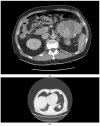The Role of Cytoreductive Nephrectomy in Renal Cell Carcinoma with Sarcomatoid Histology: A Case Series and Review of the Literature
- PMID: 36005171
- PMCID: PMC9406807
- DOI: 10.3390/curroncol29080433
The Role of Cytoreductive Nephrectomy in Renal Cell Carcinoma with Sarcomatoid Histology: A Case Series and Review of the Literature
Abstract
Background: Renal cell carcinoma with sarcomatoid dedifferentiation represents a rare histological entity characterized by aggressive behavior, limited efficacy of tyrosine kinase inhibitors or mTOR inhibitors, and poor outcome. The immune checkpoint inhibitor therapy regimen combining ipilimumab with nivolumab represents a new standard of care for this patient population due to a hitherto unprecedented response rate and overall survival. On the other hand, the role of cytoreductive nephrectomy in metastatic renal cell carcinoma, in particular, with sarcomatoid histology, remains controversial.
Patient and methods: In the present case series, we report six patients with locally advanced or synchronous metastatic sarcomatoid renal cell carcinoma and intermediate or poor International Metastatic RCC Database Consortium (IMDC) risk score, five of whom were successfully subjected to cytoreductive nephrectomy.
Results: All six patients received the combination regimen of ipilimumab with nivolumab. Five of these patients underwent upfront cytoreductive nephrectomy followed by systemic treatment without any significant delay, with a durable treatment outcome. Notably, two patients with poor prognostic features achieved a long-term major partial response to therapy. We also performed a review of the literature on optimal treatment strategies for patients with sarcomatoid renal cell carcinoma.
Conclusion: Herein, we highlight the feasibility of performing cytoreductive nephrectomy in patients with intermediate/poor prognosis metastatic renal cell carcinoma with sarcomatoid dedifferentiation followed by immunotherapy with ipilimumab and nivolumab. To enhance the chances of immunotherapy success, cytoreductive nephrectomy should also be considered for patients presenting with a disease with adverse prognostic parameters.
Keywords: checkpoint inhibitors; cytoreductive nephrectomy; immunotherapy; renal cell carcinoma; sarcomatoid.
Conflict of interest statement
The authors report no conflict of interest in this work.
Figures



References
-
- Kim T., Zargar-Shoshtari K., Dhillon J., Lin H.Y., Yue B., Fishman M., Sverrisson E.F., Spiess P.E., Gupta S., Poch M.A., et al. Using percentage of sarcomatoid differentiation as a prognostic factor in renal cell carcinoma. Clin. Genitourin. Cancer. 2015;13:225–230. doi: 10.1016/j.clgc.2014.12.001. - DOI - PubMed
-
- Kyriakopoulos C.E., Chittoria N., Choueiri T.K., Kroeger N., Lee J.L., Srinivas S., Knox J.J., Bjarnason G.A., Ernst S.D., Wood L.A., et al. Outcome of patients with metastatic sarcomatoid renal cell carcinoma: Results from the International Metastatic Renal Cell Carcinoma Database Consortium. Clin. Genitourin. Cancer. 2015;13:e79–e85. doi: 10.1016/j.clgc.2014.08.011. - DOI - PubMed
Publication types
MeSH terms
Substances
LinkOut - more resources
Full Text Sources
Medical
Miscellaneous

